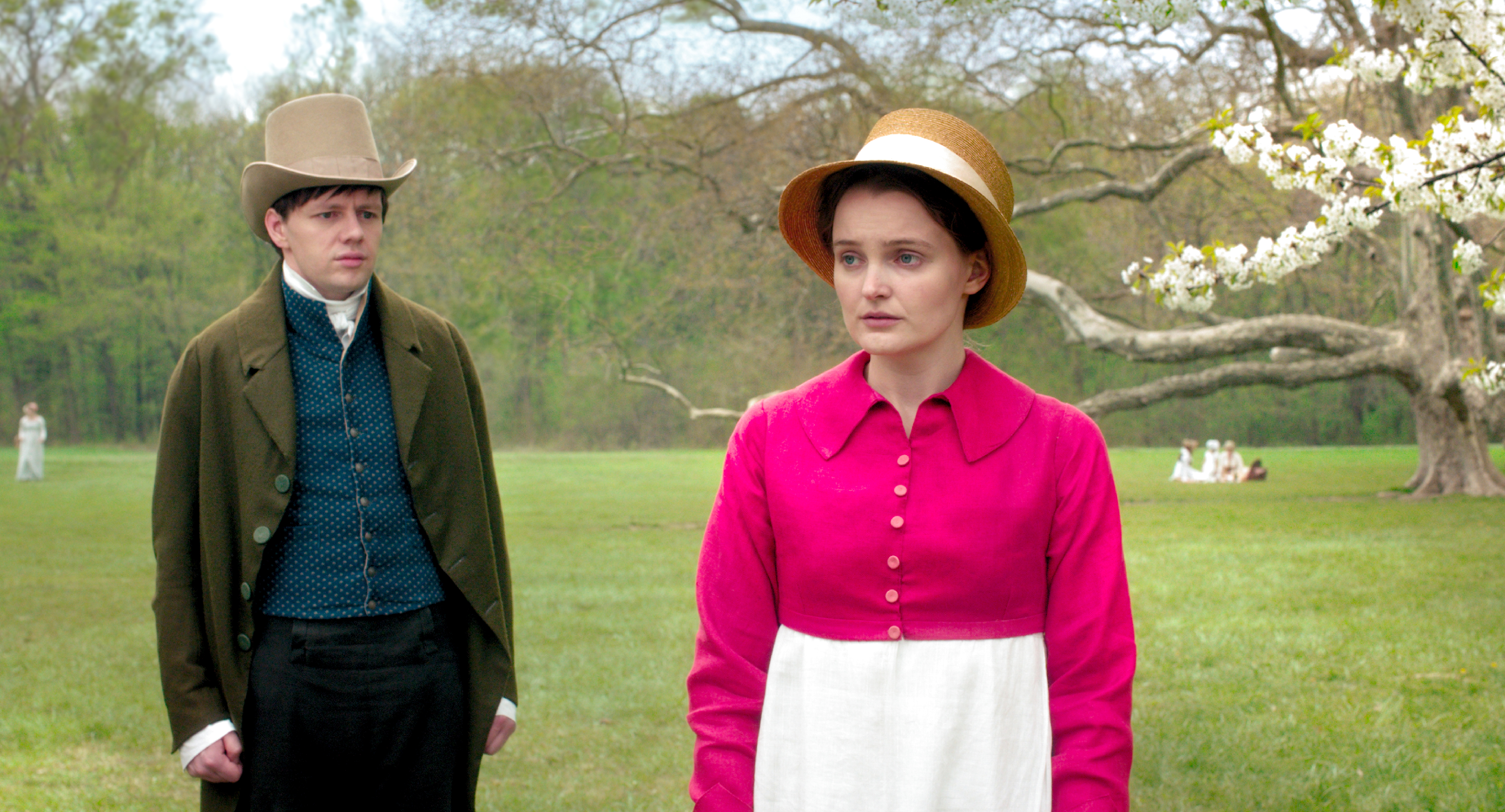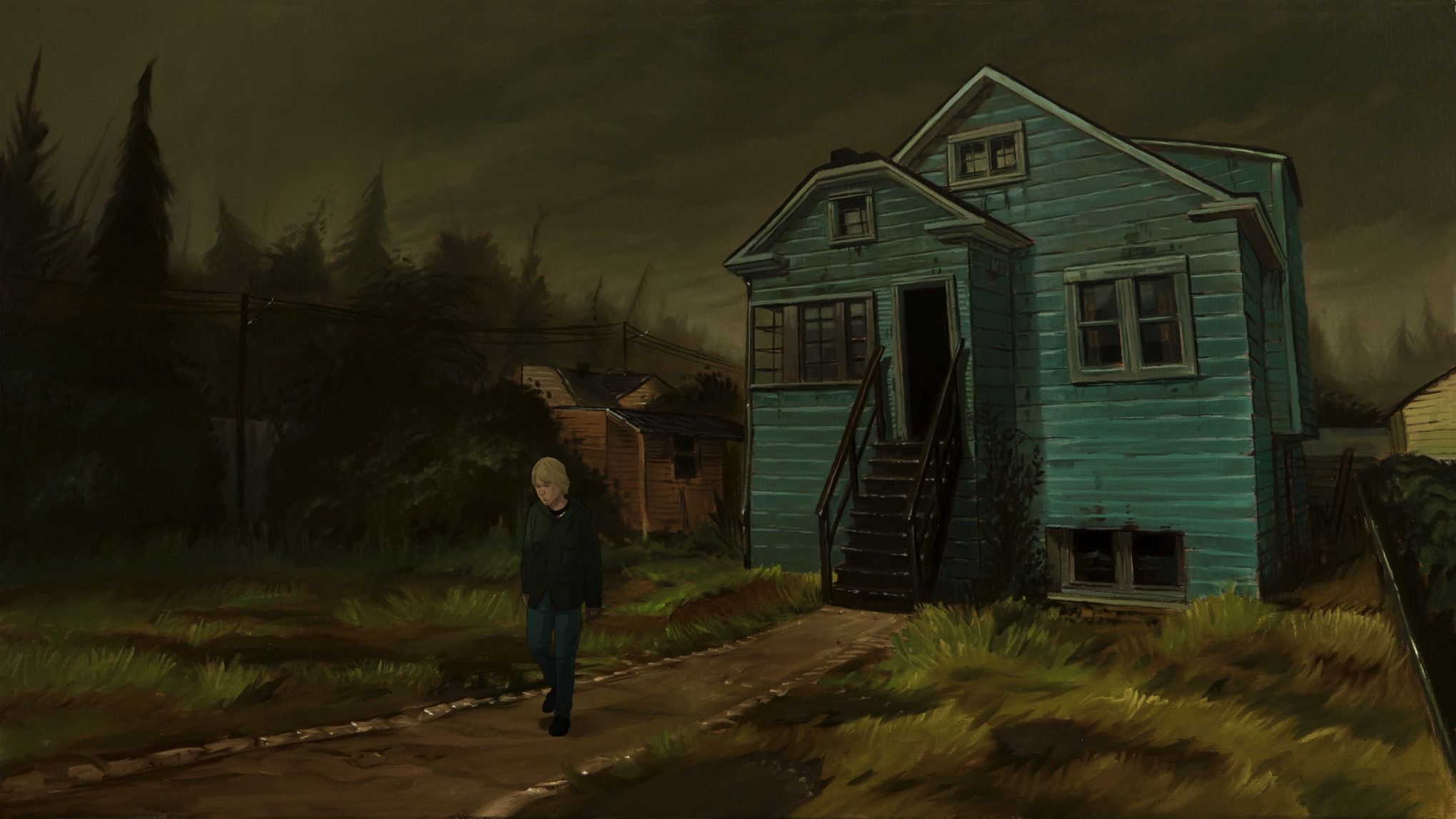Opening ThisWeek
PAmour Fou
Runs Fri., April 24–Thurs., April 30 at Grand Illusion. Not rated. 96 minutes.
In November 1811, in accordance with their suicide pact, the great German Romantic writer Heinrich von Kleist shot and killed Henriette Vogel on the shores of the Kleiner Wannsee outside Berlin. Then he shot himself in the head. There are undoubtedly many ways you could tell this story, and some of them would be of the lip-trembling, violins-keening variety. Amour Fou isn’t that. Instead, Austrian director Jessica Hausner has fashioned a formal, feminist, wickedly humorous variation on history.
The movie suggests that Henriette (the placid Birte Schnoeink) is a Napoleonic-era version of a 1950s American housewife. She’s produced a daughter for her husband (Stephan Grossman) and is content to be his property, as she puts it. But she has an empathetic reaction to the sad characters of Kleist’s story The Marquise of O, and when the author (Christian Friedel, from The White Ribbon) hears this, he focuses his sad-sack attention on the caged bird. The film treats Kleist as a foolishly doomy beatnik, pressing his case with Henriette based on a grandiose idea of what the ultimate gesture of love might be. She has her own reasons for going along with the plan.
Hausner previously directed Lourdes, a very odd and subversively funny 2009 film about a pilgrimage. Amour Fou is similarly irreverent toward its subject; it’s almost a parody of the Great Author subgenre. The look of the film is rigid and stilted; its costumes draped in rich colors, its wallpaper in vertigo-inducing patterns. (No wonder Henriette goes from singing at parties to fainting on the couch.) Hausner has cast the movie brilliantly: We know volumes about wife, husband, and poet just from their faces and the way they move. Ideal as they are, the actors certainly aren’t allowed to act much—although Sandra Huller, in just two or three scenes, is masterly at communicating her disbelief at Kleist’s ideas. She plays the woman initially invited to join him in the suicide pact, before his fixation on Henriette takes over. Hausner sympathizes with her perspective, although it’s odd that in telling the story from the woman’s viewpoint, the film actually makes Henriette more of a victim than the historical version suggests. (In real life, according to traditional accounts, Henriette instigated the suicide plan.)
No such grand passions for this movie. It snickers at such nonsense, and if you get into its mode, you probably will, too. Robert Horton
Black Souls
Opens Fri., April 24 at Sundance Cinemas. Not rated. 103 minutes.
In a certain kind of Italian mob picture, you expect blood feuds, family feasts, and generational conflict. Certainly Francesco Munzi’s adaptation of a popular crime novel has all that, but it’s more family drama than shoot-’em-up. Matteo Garrone’s recent Gomorrah went for flash and sizzle, revitalizing the somewhat tired mafioso genre. Munzi instead dwells on the quiet moments and inner lives of the Carbone clan, which hails from a hilltop village in Calabria (the toe of the boot that kicks Sicily); though its pan-European criminal enterprise is run from Milan.
Handsome bull Luigi (Marco Leonardi) and bespectacled Rocco (Peppino Mazzotta) are the mobsters, while eldest brother Luciano (Fabrizio Ferracane) has remained an honest farmer back in the ancestral village. That it’s been ruined by earthquakes makes gray-bearded Luciano a figure living in the past; no surprise that his coked-up hothead son Leo (Giuseppe Fumo) wants to get the hell out. Again, there’s nothing novel about these well-paced clashes and conflicts. Nor does it help with the slow, sticky plot to chart the various grudges and obligations owed the rival Barreca and Tallura clans. The Carbones are inexorably undone from within, seemingly cursed by their own blood.
When Rocco’s red-haired Milanese wife (Barbora Bobulova) visits the Carbone village for a funeral, she’s repelled by the old village pieties and protocols. It’s like a smothering museum visit for her—and also a dismaying perspective on the underlying architecture of the family she’s joined. Munzi may smack us with an unexpected ending, but mainly one feels the crushing pressure of the past. Luciano even takes a health tonic mixed with the grit from the village church’s collapsed stones. It’s poison, yet it’s all the Carbones know how to drink. Brian Miller
PKurt Cobain: Montage of Heck
Runs Thurs., April 23–Thurs., April 30 at SIFF Cinema Egyptian. Not rated. 132 minutes.
Headed for HBO on May 4 (with companion book to follow), this fascinating documentary portrait will have strong appeal in Seattle—even among viewers for whom, like me, Cobaniana seems a completely exhausted subject, two decades after the Nirvana front man’s suicide. It’s a vivid, impressionistic, and often contradictory profile that reaches deep into the Cobain family archives. Director Brett Morgen (The Kid Stays in the Picture, Chicago 10) spent an arduous eight years haggling with widow Courtney Love and the now-22-year-old Frances Bean Cobain, who controls the archives and executive-produced the picture. (Love her or hate her, Love relinquished her interest, but is prominent in home movies and a recent interview.)
Local music writer Charlie Cross, in his necessary 2001 biography Heavier Than Heaven, has been through most of the same material, but Morgan now brings it to life with animated sequences (by Stefan Nadelman and Hisko Hulsing) and more. The movie’s too long, though never less than engrossing, and you can see why Morgen wrestled so long with the editing. What a short, rich, and troubled life his subject lived.
All the contemporary interview subjects have a somewhat self-serving agenda here. Gentle, concerned Krist Novoselic comes off the best (no sign of Dave Grohl, however). Love is candid where that candor can burnish her unapologetic, tough-girl rep. (Her daughter isn’t interviewed.) Cobain’s family still remains rather touchingly baffled by their son. And his Olympia girlfriend, Tracy Marander, provides perhaps the best window into the transformation of an ambitious young artist who hunkered down in her house with a four-track recorder and his notebooks, laying out the blueprints for his future band’s meteoric success (seen in concert clips and MTV interviews).
It’s from that period that Cobain’s cassette-tape journals spring into animated vignettes. (Do I detect a trace of Charles Burns here?) The most remarkable of them, about trying to lose his virginity with a possibly disabled girl in Aberdeen, reminds me of a Raymond Carver story: concise, unsparing, brutal in its details, yet oddly compassionate toward all thwarted, unhappy parties. The episode ends in shame and a suicide attempt. There’s a mournful self-awareness here that colors the rest of the film. Even as Cobain grasps for success, there’s the parallel feeling that it’s undeserved and fraudulent. Long before heroin entered his life, self-disgust had seeped into his veins.
Like his source material, and true to the movie’s title, Morgen has made a fittingly unruly patchwork distillation of a messy, self-destructive life. Romanticism and myth have been cast aside. A tidy documentary would only be possible about a less talented, less tormented artist. (Note: Morgen will attend Thursday night’s opening for a Q&A.) Brian Miller
Little Boy
Opens Fri., April 24 at Oak Tree and other theaters. Rated PG-13. 100 minutes.
This home-front family drama of hope, friendship, and faith, shot through the sepia-tinged light and faded hues of nostalgia, is part of a new trend. Faith-based movies are increasingly breaking out of niche theaters and into wide release. Roma Downey and Mark Burnett, prior stewards of The Bible and Son of God, are executive producers of Little Boy, directed by Alejandro Monteverde in a Norman Rockwell-style 1940s California seaside village (actually created in Mexico).
Pepper Busbee (Jakob Salvati) is the adorable 7-year-old whose stunted growth makes him look like either a sophisticated toddler or a juvenile understudy for The Wizard of Oz’s Lollipop Guild. His fun-loving dad (Michael Rapaport) is a POW being held by the Japanese, so Pepper—nicknamed “Little Boy” because of his inexplicable size—undertakes a mission of good deeds to please God and bring Dad safely home. You know the story: The earnest, comic-book-crazy kid takes Bible parables literally, and his hometown odyssey gives him strength, inspires the townsfolk, and makes everyone believe in miracles. Oh, and Little Boy also overcomes racism, when Pepper befriends Mr. Hashimoto (Cary-Hiroyuki Tagawa), the elderly Japanese man shunned by all save the local priest (Tom Wilkinson, picking up a few days’ work as the town’s worldly-wise conscience).
Little Boy is tonally uneven, jumping from hate-crime violence to sentimental scenes that may cause insulin shock. Once the film’s bullies and bigots serve their dramatic purpose, they all but disappear. Meanwhile the creepy undercurrent of affable town doctor Kevin James’ inappropriate attentions to Pepper’s mom (Emily Watson) is just shrugged off. But the biggest frustration with Little Boy is how—as so many religious dramas do—it simply rewards innocent faith with miracles, rather than exploring how it can console troubled individuals and pull communities together. Just because a prayer isn’t answered doesn’t make it less valuable.
Still, Little Boy wears its halo lightly, forgoing sanctimony and sermons. Which is great for secular audiences who, rather than movies strewn with sex and foul language, may prefer films wrapped in nostalgia, sentiment, and heartwarming affirmation. If it were less precious and a little smarter (clever historical twists carry the film only so far), it might even have had a chance here in godless Seattle. Sean Axmaker
The Water Diviner
Opens Fri., April 24 at Sundance and other theaters. Rated R. 111 minutes.
Joshua Connor (Russell Crowe) is a dowser, a man who can find water in the Australian desert—a talent he will later employ when he goes searching for the bodies of his three sons, all lost on the same day in the disastrous World War I battle of Gallipoli. This supernatural touch isn’t really necessary to the film’s plot, and it’s a curious choice for Crowe (this is his directing debut). Part of Crowe’s immense credibility as an actor is how grounded he is—woo-woo stuff is really not for him. But the mystical hint is a sign of the film’s reach for significance, and of Crowe’s desire to say a few things while telling a very sincere story.
The Water Diviner follows Connor to Turkey, newly stripped of its status as the Ottoman Empire and now (in 1919, that is) overrun by British troops searching the Gallipoli battlefield. The movie hints at the strangeness of the impulse to find and memorialize the dead (Connor’s whole purpose in traveling halfway across the world is to bring his sons’ bodies back to Australia). Yet eventually it forgoes this subject—and Crowe’s convincing depiction of grief—to settle instead on melodrama. Connor strikes up a friendship with hotelkeeper Ayshe (Olga Kurylenko) and her impish son, escapes from a train ambush on horseback, and runs afoul of political unrest. Crowe is careful to trace the way Connor evolves from a Turk-hating outsider to a man who appreciates the wisdom and dignity of a local military chief (Yilmaz Erdogan). Yet this is the kind of movie that espouses universal brotherhood while settling for easy jokes about the Easterners and their exotic ways.
As a director, Crowe is earnest and old-fashioned, and there are movie-watching pleasures to be had here. Lord of the Rings cinematographer Andrew Leslie knows how to look at big open spaces so you sense the bones beneath the surface. The film gets bogged down in its many flashbacks and sidebar dramas (of course Ayshe, whose husband died in the war, is menaced by the husband’s brutish brother), and finally uncorks one too many unlikely coincidences. Crowe has lavished a great deal of effort on this project, the subject of which is widely memorialized in Australia and New Zealand (the sacrifice of thousands of soldiers was vividly told in Peter Weir’s 1981 film Gallipoli). The Water Diviner feels almost too careful in its desire to hit all the right notes and do justice to all sides. Which makes it more of a war memorial than a living, breathing movie. Robert Horton
E
film@seattleweekly.com







